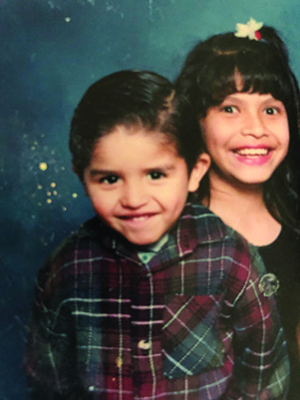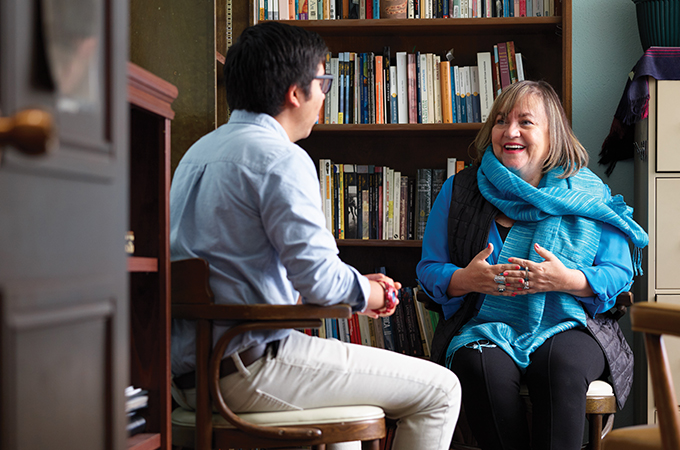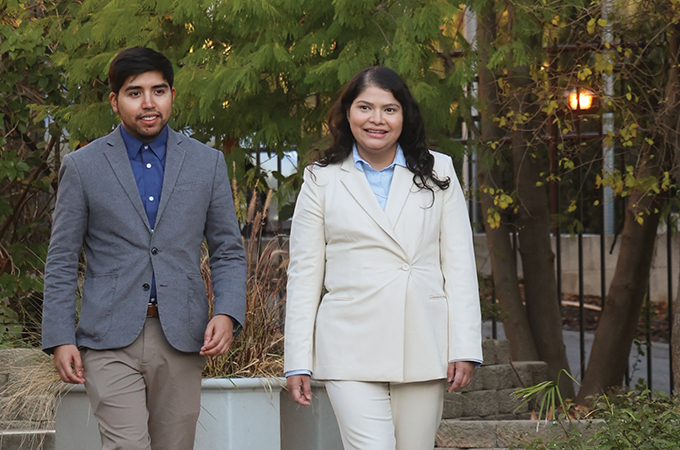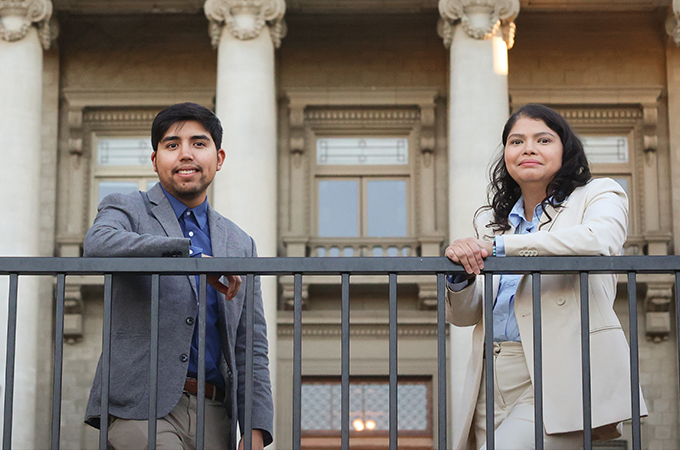Standing in the Greek Theatre in April, Jazmin Zepeda ’22 could barely believe she was graduating. She looked out to the audience, knowing her family—her parents, her 5-year-old daughter, her siblings, including John Zepeda ’18, ’20—were all cheering for her.
It was a challenging two-year journey for the College of the Desert transfer student: She navigated COVID-19 anxiety and online classes and home-schooled her daughter, but she was undaunted. She was applying to the Master’s in Teaching and Learning program at U of R’s School of Education, and she was ready for the next part of her life to begin.
August 2017

John was in the last semester of his senior year at the University of Redlands in 2017 when his family received devastating news: Jazmin—older by five years—was diagnosed with two different types of cancer: T-cell lymphoma and acute lymphoblastic leukemia with the Philadelphia chromosome.
Singularly, T-cell lymphoma has a survival rate of 66 percent, but acute lymphoblastic leukemia? That has a 6 percent survival rate in adults.
Still, the Zepedas did everything they could to ensure that Jazmin survived; she had a 1-year-old daughter, and she was only 27. Apart from the two types of cancer, Jazmin was healthy—there was no reason she couldn’t fight it.
John, then 22 and a first-generation student, transferred into Redlands the year prior from the College of the Desert, majoring in environmental studies and Spanish. He became a teaching assistant for Professor of Spanish and Latin American Literature Ivonne Gordon-Vailakis, who mentored him through his transition to a four-year university. He planned to earn his MBA after graduation.
January 2018
Fortunately, John was a 50 percent match for a bone marrow transplant that would significantly raise Jazmin’s chances of survival. “When I found out that I would be her donor and that she would need more intensive care, I dropped my classes,” he says. Apart from being her caregiver, John was willing to risk the transplant so Jazmin would live, even though that meant withdrawing from the University of Redlands.
His own graduation, he thought, could wait.
But Gordon-Vailakis and Professor of Environmental Studies Tim Krantz wouldn’t let that happen.
Once they found out why John needed to withdraw, both worked on their own time ensuring he could obtain both bachelor’s degrees. “It broke my heart. But if you have to choose between finishing your degree and saving your sister’s life ... .” Gordon-Vailakis trails off. “John became my hero, a model of what we want everyone to achieve.”
April 2018
“My odds of beating cancer were not very good,” Jazmin says. “[Doctors and nurses] basically said my chances of surviving were pretty much zero.” Even before the transplant, there were Neupogen shots, pills, and various medical treatments. “I had to go through all these x-rays—brain, chest—to make sure I could handle it.” And it hurt, she says: “It was a deep, deep bone pain, where I couldn’t even stand. It felt like little needles stabbing me on my bones.”
City of Hope extracted John’s bone marrow on January 25; Jazmin received the transplant the next day. The bone marrow transplant worked, and Jazmin did get better. Within weeks, she was in recovery and preparing for chemotherapy.
Jazmin’s daughter didn’t understand what was happening, but she knew her mom was in pain. “When my hair started falling off, I was afraid my daughter wouldn’t recognize me or be scared, but she just touched my head and gave me a kiss,” she says.
“The chances were against her in every way, and she still persevered,” John says.

Meanwhile, he kept Gordon-Vailakis abreast of Jazmin’s status and recovery—and the professor urged him to re-enroll and finish his degrees. There was extra administrative work to do, Gordon-Vailakis says, but it was just part of her mission at U of R:
“I take advising very seriously,” she says. “It’s an important task that needs to be done efficiently and with the heart, and John absolutely deserved to graduate.”
She sought to do everything in her power to help him graduate, including an independent study class. Transfer students are especially important to her because they only have two years on campus. “Because they come from a different experience, they really appreciate that personal attention at U of R,” she says.
Miraculously, Jazmin was released from the hospital on April 20, 2018. It was the same day as John’s undergraduate Commencement ceremony.
October 2019
When Jazmin recovered from cancer, she decided to go back to school and finish her degree.
John advised her to consider Redlands, despite the fact that they were both nontraditional students who were outside of Redlands’ typical age range. “I knew that she could get a master’s in just a year after finishing her bachelor’s, so it would save time,” he says. “Why not? She’d already gone through so much, so what’s a little bit more of a challenge, right?”
When Jazmin came to Redlands, it made sense for her to ask Gordon-Vailakis to be her advisor as well, even though she started the school year during the pandemic. She also became Gordon-Vailakis’ teaching assistant. “I helped her with everything on Zoom, looked up poems, shared materials for class—anything she needed.” She adds, “I got to read her poems first!”
“For me, teaching online [during the pandemic] became a more intimate way to interact with students because I saw their environments,” Gordon-Vailakis explains. “In Jazmin’s case, I saw her daughter who would sometimes come to our classroom; I knew Jazmin had health challenges. … I was able to see more of her home environment and be a more effective advisor.”
Some Latino students in difficult situations don’t always ask for help. Gordon-Vailakis adds. “I was very keen to create an environment where Jazmin felt comfortable asking for help and advice.
“To me, it’s a privilege to be part of such an important process here at the University, where we can touch people’s lives and help them be successful. As educators, what is more valuable than this?”

April 2022
Long before Jazmin’s cancer diagnosis, she’d dreamed of becoming a teacher. As a child, she would volunteer to help her kindergarten teacher organize, clean, and work in the classroom each day. “I did that from elementary school all the way through high school; I’d
even help her organize her classroom on the weekends,” she adds.
Her teacher gave Jazmin books and school supplies … and a desire to teach children herself. “When I played pretend as a child, I’d always be a schoolteacher, print out work sheets and pass out homework. I’d grade them for my brothers and cousins, and pretend to give out candy and stickers,” she says, smiling.
Because her parents migrated to the United States from Mexico, she didn’t learn to start writing and speaking in English “technically, until sixth grade,” she says.
Reading—“especially Harry Potter books!”—became Jazmin’s path to English fluency and her safe space, helping her become a lifelong learner. “I would look at the dictionary and learn words until [I got to a point where] I didn’t feel embarrassed talking in English,” she says. “That’s why I love reading books.”
This love of learning spurred her to apply to the School of Education. For now, she’s unsure of what she’ll do with her future master’s degree. She could become a teacher in her district, open a daycare, or a charter school.
What she knows for sure is that she wants to help people: “Where we’re from, people don’t have a lot of money, or a lot of help. I want to be the best teacher I can for them so [my community] can have a positive view of education and want to learn.”
After receiving his bachelor’s degree, John went on to earn his MBA with a concentration in location analytics at the U of R School of Business & Society. Today, he works as a consultant for Esri, the global leader in geographic information systems (GIS).
“Our parents didn’t have much when they came here from Mexico, so I don’t think they expected us to get as far as we have,” says John. “So it’s nice for our family to see both of us succeed.”
And whatever challenges come her way, Jazmin is ready. “[Surviving cancer] definitely makes you appreciate everything else, especially the things that really matter to me,” she says, recalling how she joked about life and death situations with her nurses at the hospital. “I mean, If I can’t laugh about it now, when will I be able to laugh about it? I’m alive. I’m here, I beat all the odds.”
Learn more about programs of study at the University of Redlands or explore the latest issue of Och Tamale magazine.






